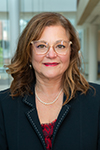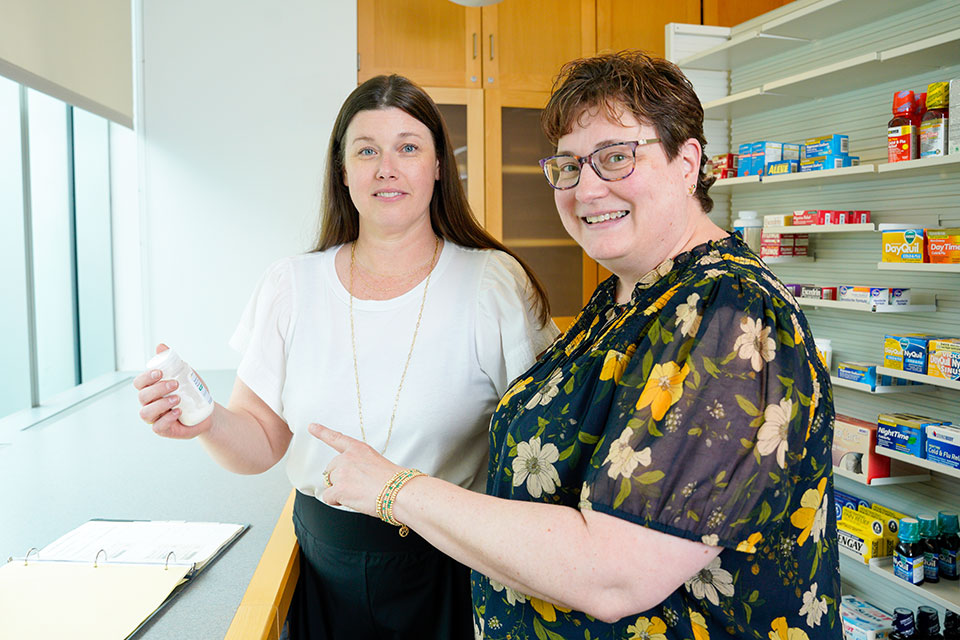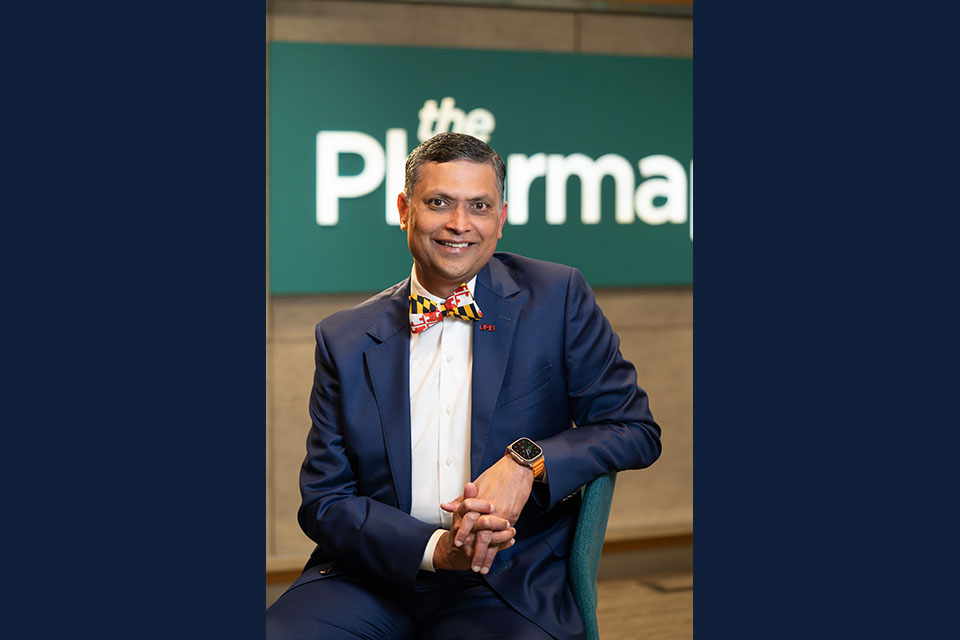Programs Reap the Benefits
Thanks to philanthropic support, the School of Pharmacy is dotting the i’s of involvement and innovation through the PATIENTS Program and Pharmapreneurship™.

By Gwen Newman
August 16, 2022
Thanks to philanthropic support, the School of Pharmacy (SOP) is dotting the i’s of involvement and innovation through the PATIENTS Program and Pharmapreneurship™.
Spawned by the Department of Pharmaceutical Health Services Research (PHSR), the PATIENTS Program was founded in 2012 with a mission to partner with patients, care providers, and community members and organizations to answer questions about the best treatment options to improve health and quality of life. It engages people from all communities, especially those from underserved and minority populations, in every step of the patient-centered outcomes research (PCOR) process.
“The goal of health equity research is to eliminate the inequities — both the social and economic factors — that are faced by underserved populations,” says C. Daniel Mullins, PhD, professor and executive director of the PATIENTS (PATient-centered Involvement in Evaluating the effectiveNess of TreatmentS) Program.
“But the problem too often is that programs funded through grants alone typically support only the initial research gathering phase and not continuing communication and follow-up in the communities where the data was collected.”
The PATIENTS Program was initially funded by a $5 million grant from the Agency for Healthcare Research and Quality, which allowed for the development of programmatic infrastructure that’s since been nationally recognized for expertise in PCOR. The program also has received $2 million from the National Institute on Aging and, just as importantly, private contributions from local supporters and experts in the field.
“The value of the PATIENTS Program is that it listens and gives people the opportunity to voice their opinions and see the research they care about conducted,” says Samantha Dougherty, PhD ’12, who spent five years as a student in PHSR’s PhD program and now serves as a deputy vice president at PhRMA, one of the PATIENTS Program’s supporters. “As a bridge between research and the community, the PATIENTS Program has been a visible partner in the community. It makes sure research results are shared with the West Baltimore community, the rest of Maryland, and beyond. The PATIENTS Program makes an impact for patients, which is why PhRMA is proud to support it.”
Importance of Diversity
Research has demonstrated that medications, medical devices, and behavioral interventions can be made safer and more effective for all people when clinical studies include diverse populations. However, addressing the wide range of physical, socioeconomic, and other barriers that prevent aging and underserved individuals from participating in these studies remains a challenge for many researchers. The PATIENTS Program’s community partners provide the traction and trust to make that viable.
“The beauty of the program is that patients are empowered,” says Franklin Lance, DMin, president and CEO of the Parks and People Foundation and senior pastor of Baltimore’s Mount Lebanon Baptist Church in Greater Mondawmin. “Their voice is heard authentically and has caused an actual change in protocols. For too long, research has really been all about the principal investigator and participants were ‘subjects’ and not people. The PATIENTS Program is changing this paradigm where participants have valid voices, thoughts, concerns, and needs.”
In August 2021, the program launched its PATIENTS Professors Academy (PPA) where community partners and researchers from the School of Pharmacy share their process in an online course that teaches participants the program’s 10-step framework for continuous patient and stakeholder engagement. Designed for fellow colleagues and interested community partners, the academy’s graduates will be able to advise companies, government agencies, community-academic partnerships, and other entities on ways to make clinical and translational research more relevant, appealing, and diverse. The buy-in from companies engaged in pharmaceutical research and interested in enhancing the patient voice in their studies has been huge, with $1 million raised in support of PPA.
“One of the most important aspects of true community-engaged research is remaining in the community in between research projects,” says Mullins. “There are real costs to patient and community engagement. Benefactors and philanthropists support those costs that don’t fall within a grant or contract. I’m very grateful for all those who support the PATIENTS Program’s engagement efforts and, in turn, the residents of West Baltimore.”
Adopting an Innovative Mindset
 Philanthropy was just as important for SOP’s Pharmapreneurship initiative, which is exclusive to the School and demonstrates its commitment to supporting and best positioning faculty, staff, and students to achieve their career aspirations and address the nation’s health care challenges.
Philanthropy was just as important for SOP’s Pharmapreneurship initiative, which is exclusive to the School and demonstrates its commitment to supporting and best positioning faculty, staff, and students to achieve their career aspirations and address the nation’s health care challenges.
Launched in 2017, “pharmapreneurship puts a name on the unprecedented opportunity and unique experiences we have in igniting creativity, confidence, and fearlessness to empower our faculty, students, and our staff to be critical thinkers and problem solvers,” says Natalie D. Eddington, PhD ’89, FAAPS, FCP, dean and professor at the School.
 “Pharmapreneurship in the simplest of terms describes our pharmacy entrepreneurs,” says Magaly Rodriguez de Bittner, PharmD ’83, BCPS, CDE, FAPhA, the School’s Felix Gyi Endowed Memorial Professor in Pharmapreneurship who oversees the program. “Strategies and skills that pharmapreneurs across the fields of pharmaceutical health services research, pharmacy practice, and pharmaceutical sciences might demonstrate include innovation of new products, services, or processes; continuous process improvement; exploration; technological innovation; business intelligence; development of future products and services; and optimized talent management.”
“Pharmapreneurship in the simplest of terms describes our pharmacy entrepreneurs,” says Magaly Rodriguez de Bittner, PharmD ’83, BCPS, CDE, FAPhA, the School’s Felix Gyi Endowed Memorial Professor in Pharmapreneurship who oversees the program. “Strategies and skills that pharmapreneurs across the fields of pharmaceutical health services research, pharmacy practice, and pharmaceutical sciences might demonstrate include innovation of new products, services, or processes; continuous process improvement; exploration; technological innovation; business intelligence; development of future products and services; and optimized talent management.”
Rodriguez de Bittner is herself a recognized pharmapreneur who has dedicated her career to developing and implementing new health care delivery models across a variety of practice settings. She was named the Gyi Endowed Professor in 2021 after the endowed professorship was established by Terry Gyi, BSP ’83, PharmD ’06, and her daughter Rebecca Gyi-Hovis, MD, in memory of their late husband and father Felix A. Khin-Maung-Gyi, BSP ’83, PharmD, MBA, chair and founder of Chesapeake Research Review and posthumous recipient of the School of Pharmacy’s Founding Pharmapreneurs Award.
Since its inception, the program has created academic opportunities for students such as a pharmapreneurship pathway in the PharmD program and scholarships such as the Wagner Family and Felix Gyi memorial scholarships for students who have demonstrated interest and talent in entrepreneurship. Recently, the School received a commitment from John Gregory, BSP ’76, DPS (Hon.) ’02, to establish the Dean Natalie Eddington Venture Fund, which will provide $100,000 to the winner of the School’s annual Shark Tank competition in perpetuity.
“There is strong support and belief in the importance of the adoption and integration of pharmapreneurship in the School of Pharmacy’s education, research, and practice settings,” says Rodriguez de Bittner. “This is indicated by the more than $4.2 million that has been invested in the program by donors over the last five years.”
“A Privilege to Contribute”
In 2019, the Center for Women in Pharmapreneurism (CWP) was established through donations from SOP Founding Pharmapreneur Ellen H. Yankellow, BSP ’73, PharmD ’96, Jill Molofsky, BSP ’81, and the late James Tristani, BSP ’73, all of Correct Rx Pharmacy Services, and other generous donors. It seeks to prepare women for the pursuit of innovative solutions to our nation’s greatest health care challenges. CWP is comprised of innovative female leaders with backgrounds in the basic sciences, research, practice, industry, academia, and nonprofit sectors.
“Because of my high confidence in and my advocacy for pharmacy, it is natural for me to invest in the potential of our students and the profession,” says Yankellow. “I am excited about the future of our graduates and what amazing accomplishments are yet to come. When I look at every pharmacy student, I see their potential and the reason for investing in their education. Their individual dedication, commitment to learning, and excitement for the future should be a true inspiration for all to get involved with their education. If you are charitably inclined and you have the ability to help out, then I consider it a privilege to contribute to their pharmacy education.”
Molofsky is vice president of Correct Rx and shares that when she and business partner Yankellow, the company’s CEO and president, first met, “she was my preceptor in my last year of pharmacy school. When I graduated, she was opening a retail pharmacy in an inner-city grocery store. I worked every other weekend at the store while I was working full time at Johns Hopkins Hospital. When she opened a second store a year later, I worked full time with her.”
Correct Rx Pharmacy Services was established in 2003 with a business model based on innovative clinical programs that offer better medical outcomes and lower health care costs.
How far Yankellow and Molofsky have both come — together — and how they both exemplify the importance of mentorship and opportunity are hallmarks of pharmapreneurship.
“These are values that we both espouse,” says Molofsky. “They’ve taken us both to where we are and represent what we want to contribute to the world around us and to our alma mater. Pharmapreneurship is an exciting initiative, and we are proud to be a part of it.”
In 2021, the School opened its designated innovation space — Pharmapreneurs’ Farm — with the help of anonymous donor support. It was envisioned in 2018 as a dedicated space for faculty, staff, and students to collaborate, nurture, and develop their pharmapreneurial ideas. Its prominent location in the Ellen H. Yankellow Grand Atrium is a visible reminder to all who enter Pharmacy Hall of the importance the School places on “cultivating and growing” the next generation of pharmapreneurs and cutting-edge ideas for pharmacy’s role in entrepreneurship, Eddington says.
The Farm is equipped with state-of-the-art technology that allows for presentations and demonstrations both in person and virtually and is designed with collaboration in mind. It was completed in the spring of 2020 but sat empty due to the coronavirus pandemic until its official opening in October 2021.
“Pharmapreneurship works to develop a mindset in our students about innovation and entrepreneurship,” says Rodriguez de Bittner. “We’re creating a new set of students who think differently and are seeking to solve problems versus settling for the status quo.
“Fortunately,” she adds, “we have donors who believe in and hold that same philosophy and who help make this program possible. These contributions and donations are critical for our School to move the program forward, to give faculty and students a forum in which to prove the viability of a concept and innovation, and to make positive changes in health care, research, practice, and in communities. We are forever grateful.”



